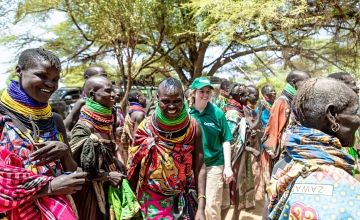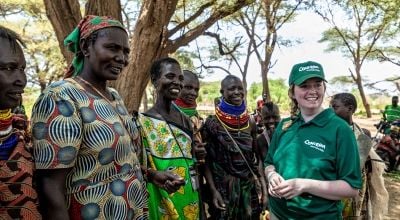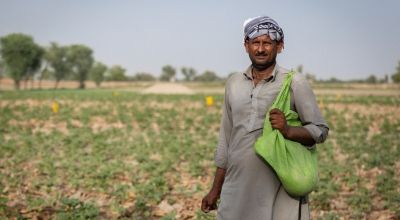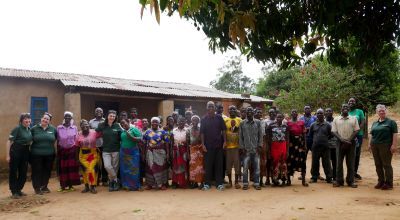
Read our 2024 annual report

Knowledge Hub
Climate change is already ravaging parts of the Horn of Africa, decimating livelihoods and threatening widespread hunger. But there are ways we can support communities in protecting themselves.
Landscapes littered with animal carcasses. Silence hanging in the air, with no birdsong heard for miles. Children growing weak with malnutrition as their parents struggled to find food.
This was the scene in Turkana, Kenya’s largest province, in 2022 as it suffered through the Horn of Africa’s longest and most severe drought in 40 years. It had not rained since 2020, and communities that largely depended on pastoralism for a living - and food to feed their families - were left with nothing. As water sources dried up and land was scorched, pastoralists had no places for their livestock to graze, or no fodder to feed them. Widespread livestock deaths destroyed livelihoods in an arid and semi-arid region where pastoralism had sustained families for generations.
In July 2022, following a visit to Turkana with Concern, Caroline O’Doherty of the Irish Independent wrote: “Two years of drought have sucked every visible drop of moisture from the baked earth. It has blackened the trees, shrivelled the thorny shrubs and dried the throats of those who talk too long. It stripped the roaming plains of grass and starved the community’s livestock — the only source of earnings in the remote settlements of this semi-nomadic society.”
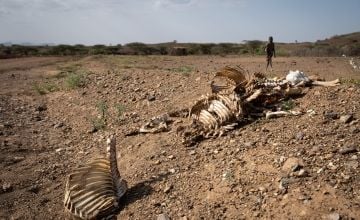
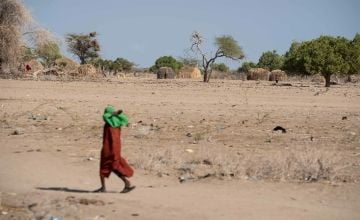
We spoke to mothers trying to find wild fruits to feed their children, after the value of the charcoal they sold for a living plummeted. A farmer who used to have 1,800 goats and sheep was left with just 60 due to torrential floods followed by extreme drought. One woman, who sought treatment for her young son at a malnutrition clinic supported by Concern, predicted that if rains continued to fail, “people will die. There is no future if the next rains don’t come and we don’t get support."
> Read more stories of people affected by drought in Kenya
This scene was followed by further months of failed rains, so it’s hard to imagine that communities across Turkana could ever recover. But as the effects of climate change persist, the people of Turkana are adapting to this new reality, and building their resilience against extreme weather events.
Concern and climate smart agriculture

Despite what arguments in comments sections might say, climate change is real, and it is affecting the lives of people in the world’s most vulnerable countries as you read this. The situation is made even worse due to the fact that many people living in the countries most affected by climate change rely on agriculture for a living.
This is why Concern uses climate smart agriculture to support communities in building resilience against current and future climate shocks. By providing access to improved farming skills, technologies and seed varieties, diversifying crops and promoting Village Savings and Loan Associations, we are able to support farmers to protect their crops and harvests, ensure a reliable income, and provide a nutritious diet for their families.
Often, this process of change starts with something as simple as water. If you have access to taps in your home, you probably don’t think too much about water, but it is key in all aspects of life - from growing our food, to cooking our food, from drinking to washing ourselves. By assisting communities in Turkana with irrigation systems and rehabilitating boreholes, landscapes have been transformed through climate smart agriculture.
The power of water
Take the town of Naoros. Climate change-induced drought hit the village hard, particularly the local women, who struggled to maintain their farm. Ruth Epat Koli, head of the Naoros mother-to-mother support group, explained: “Before Concern’s support, we used to fetch water from the river. We would carry 20 litres in a jerry can on our heads.” However, as this water was for cooking, drinking and washing, the women could not irrigate their land efficiently.
But now, an updated water system changed everything. Concern rehabilitated the village borehole to be powered by solar panels, and trained locals on how to operate it. It provides water for five days after being turned on, reducing the workload for farmers, and sustains 460 households, as well as the local primary school. Water is now available via taps in the women’s farm, allowing them to irrigate their land more easily.
Through climate smart agriculture training, the women were also taught how to diversify their crops, and how to utilise organic manure, rather than expensive chemical fertilisers.
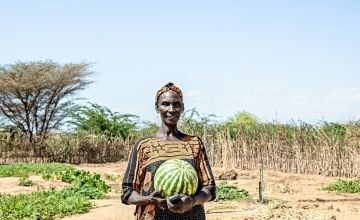
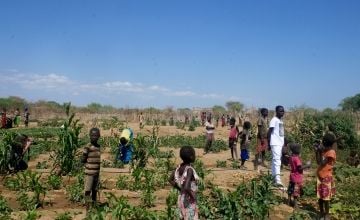
Ruth, a mother of 10, said: “We still face a challenge with livestock, due to lack of pasture. But we can now access our vegetables here. We can rely on spinach, cowpeas and watermelon. We normally have market days. We collect vegetables and sell them for money. Sometimes we keep them and use them for home use. Nothing is wasted here. We can use the fodder and give to the animals. The livestock that we still have are sustained.”
The impact of the new system can be seen across Naoros - from children able to eat hot lunches at school, to goats grazing at the trough, rather than having to be led to the river. Gerald Mutinda, Concern WASH officer, said: “The Naoros Water Project is very significant to the Naoros community because initially, there was water scarcity. The existing pump was not sufficient to serve 460 households, a school and a dispensary. There was no water supply to the dispensary, there was little water supply to the community. The community opted to use the canals, or maybe fetch water from the river. There were too many cases of bacteria infections, diarrhea, and typhoid in the area.
“But once we carried out the rehabilitation [of the borehole], it has really transformed the community. The surplus water is used for irrigation in the farm, which is helping us to fight malnutrition in the area.”
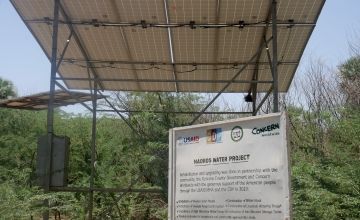
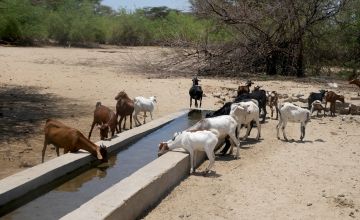
From drought, to growing watermelon
After seeing pictures from Turkana in 2022, it’s hard to imagine patches of green grass, never mind vibrant crops, growing from the dry ground. But it is possible when communities are supported with the tools and seeds they need.
Pastoralists in the town of Nadoto have had to entirely change their way of life to sustain an income or food for their families. But even as they turned to the land to plant crops, they faced further challenges, due to the invasive prosopis species. This thorny mesquite bush has been taking over much-needed land in Kenya, rendering farms unusable, and absorbing the little water available underground. Concern’s team in Turkana supported the community in reclaiming land from the prosopis bushes through cash for work, in which farmers were provided with a cash incentive to clear land.. Through this scheme, land was opened up for food production, while desilting the canal meant that water for irrigation is supplied to over 300 acres in Nadoto. This enables farmers to plant vegetables and other drought resistant crops to build resilience against climate-induced shocks.
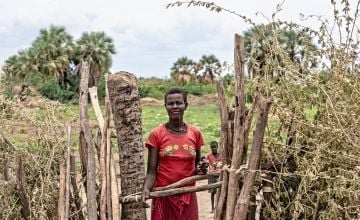
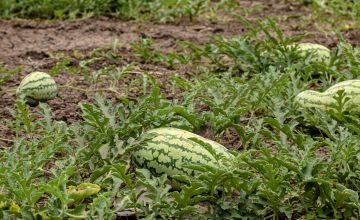
Among them is farmer Regina Erot. With irrigation provided to her plot from the canal, Regina is now able to make a large harvest of her favourite crop - watermelon. Due to the heat in Turkana, watermelons grown in Nadoto are very sweet and large, and Regina can sell an average-sized watermelon for KSh500 (€3.18). She said: “I take them to the market, and neighbours also come to buy my produce here. I make between KSh50,000 (€318) and KSh100,000 (€637) for a harvest.
While the expansion of her business depends on the rains, Regina is happy with how things are going, saying: “I feel good with my farm now, because I can look after my family. The children need to eat, they need to go to school, so I put in a lot of effort in producing my crops.”
Revitalising a community
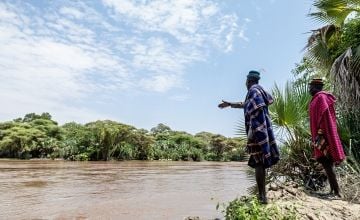
The benefits of climate smart agriculture can be clearly seen in the town of Kangalita in Turkana. Despite the Turkwel River running through Kangalita, villagers were unable to benefit from it as built up silt rendered the river useless for irrigation. In 2022, Concern supported the community to carry out the desilting, opening up the canal to provide water for irrigation for over 1,200 acres. While this three-month initiative has since ended, the community has continued to desilt the canal, and are sustaining their own water flow.
The change is evident. Where once there was scorched earth and silence, with few animals roaming, healthy cattle now graze, maize fields have grown lush, and new families have been attracted to the area.
Hassan Olow, programme director in Kenya, explained: “During production, people could see what was happening. There was an influx of 400 families. There is a reason to move there, it is worth it. There is now an opportunity to put further infrastructure into that community. There is a commitment to build extra classrooms at the school, to expand healthcare facilities. And all of this is because of the agriculture we introduced.”
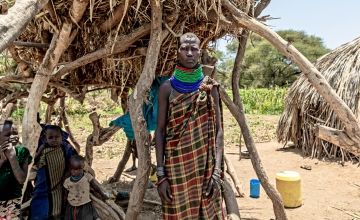
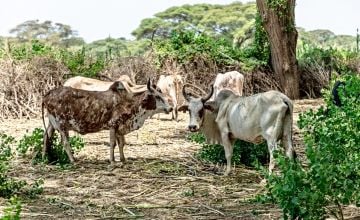
Among new arrivals in Kangalita is mother-of-four Ewalan Mojong, who lives in a hut beside her thriving maize field. She said: “During the drought season, we were facing a big challenge. We relied on ngomoa, a wild fruit. But when this project began and water was made available, we could grow our own food.
“I had many problems, a lot of stress about how to feed the children. Those problems have gone away. Two of my children have even now started attending school because of this. They really enjoy school.”
Through their own initiative, they are able to cope with the effects of prolonged drought. This is called resilience
The town has taken ownership of the irrigation project, and Golicha Dima, county programme manager in Turkana, said of the community: “Through their own initiative, they are able to cope with the effects of prolonged drought. This is called resilience. The project has transformed Kangalita.”
Tackling climate change head on
Rains may have fallen in Kenya, but this doesn’t mean they are done with drought. Another climate-induced drought is predicted in 2026. But, Concern’s Hassan Olow explains: “The drought will never end, but we can adapt to it. The drought in 2026 doesn’t have to be an emergency. Flooding will always happen, but it does not have to be an emergency.”
World leaders are gathering at COP28 to discuss whether the Paris Agreement, a pledge made in 2015 to limit rising temperatures, has actually been kept. Meanwhile, amid these conversations, millions of people are already facing hunger, malnutrition and loss of livelihoods due to the very real effects of climate change.
We can support these communities in adapting to this reality, and protecting their livelihoods, homes and families. But this must be done in tandem with real action on the world stage. Leaders must take the Paris Agreement seriously and make difficult choices to ensure that we don’t tip over the 1.5C temperature rise. They also must not renege on their commitments to provide loss and damage funding to vulnerable communities, like those in Turkana. Climate change will affect us all - but we cannot ignore those who are already paying the price.
